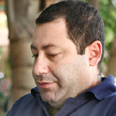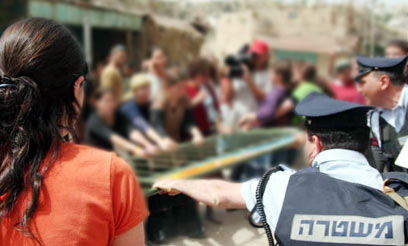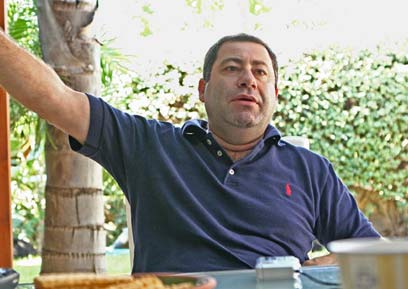
Commander: We shouldn't have befriended settlers
Outgoing Samaria Brigade Commander Colonel Yuval Bazak tells Ynet about his feelings toward settlers, war in Lebanon, war on terror. 'Hizbullah did its best to kidnap and we acted as if there was someone we signed an agreement with beyond the fence,' he says
He speaks about the arguments with the settlers, counter-terrorism activities, as well as his thoughts on the management of the war in the north and its outcomes.
Bazak is a person one should listen to: His next job will be head of the combat doctrine department in the General Staff, and he will be the person responsible for designing the State of Israel's future battlefield.
"I think that in the relationship between the army and the settlers we may have aimed to high, we may have gone too far, we may have deviated from relations that should take place between a military echelon and the population it is protecting," he says.
"The relationship was not proper between the army and the settlers. There were too many friendships. Many times the army, in the name of friendship, did not realize its responsibility, such as in the case of illegal outposts. Too many times we turned a blind eye. It was inconvenient to deal with things related to law and order," he explains.

Clashes in territories (Archive photo: Dudi Vaaknin)
He is 40 years old, a graduate of the Golani Brigade. Among his various roles, he commanded the Hermon Brigade at the Northern Command. In the past years he was at the West Bank during the intifada and the disengagement. He is leaving his job just before what is expected to be the next conflict – on the evacuation of the illegal outposts.
What you are saying is that "in the name of friendship" with the settlers illegal outposts have not been evacuated so far?
"What do you mean 'have not been evacuated'? Have been built! Beyond the legal issue there is also a security issue here – defending a community is one thing and defending a hill with three caravans is another thing."
Do you think the settlers have changed? Have they become more radical?
"The Amona evacuation was a highlight. I saw two processes: One of self-examination among the moderate majority, which is also the silent majority, and the other a process of becoming more radical among the minority. They also expanded and also became more radical. This is the most dangerous phenomenon.
"We saw many events of disturbances and violence which were not seen before, definitely not in this magnitude and pace. We see a process of becoming more radical in the organization. We see underground cells, we see that they are attempting to undermine the State, the decision makers and influential people – and therefore they must be dealt with in a different way. We need different legislation and foiling based on intelligence."
Is there a chance we will once again see terror attacks carried out by Jews against Palestinians?
"It's possible. The way we have been dealing with it until now is ridiculous."
Did you ever feel that you were being threatened by extreme Jews while serving in this role?
"I felt uncomfortable on the personal level. I did not receive threats on my life. There were times when I was hurt. When a community stands in front of you and calls you a 'Nazi' and you are defamed in the newspapers, it's not pleasant. You expect a different treatment when all you do 24 hours a day is defend them. I also expected more assertiveness from the Yesha leadership, and it also disappointed me on a certain level."
What do you think about the realignment plan?
"It's a political decision. As far as I am concerned, as a commander, what I am interested in eventually is controlling the territory. As long as we can operate inside the area in the entire zone, the Israeli government can do as it pleases."
You are entering the role of combat doctrine department head at the General Staff. Wha do you think about the management of the war in the north and what is the lesson you draw as a senior commander? Where did we go wrong?
"Our main lesson must be a preventive war. I think that in Lebanon we did not carry out a preventive war. In Lebanon we told soldiers: Don’t get kidnapped. We knew that there were threats. Hizbullah in the past six years did its best to kidnap and we acted as if there was someone we signed an agreement with beyond the fence.
"I think that the main lesson is that in any place where there is an enemy on the other side, also in a place where we had a unilateral withdrawal and there is a situation of a confrontation, we must utilize the entire area and tactical flexibility to the fullest, maybe also on the operative level. In other words, we must operate also in the depth of the area and also beyond the fence. Because at the end what we learned both in Lebanon and in Gaza is that defense – regardless of how many warnings we issue, and no matter how alert we are – is not performed in one line.

Colonel Yuval Bazak (Photo: Ronen Boidek)
"At the West Bank, before Defensive Shield, we chose to view Zone A as a contact line which we do not pass. The outcomes were clear, we had terror attacks here on a daily basis. One must remembers that overall this is one of the things that people from their couch in Tel Aviv, Haifa, Afula or Jerusalem find it difficult to understand.
"But the fact that in the past four years it has been relatively quiet, definitely not a strategic threat of terror in the West Bank, is not because the potential of threats stopped, but because there are operations inside the area every night, reaching suicide bombers, reaching cells and belts, foiling infrastructures, and the accumulating result is relative calm on the strategic level. But this calm was built of many events, small thwarting operations that happen every night in the depth of the territory."
Is this what should also happen in southern Lebanon?
"This is what should happen in any place where we have a confrontation and there is an enemy on the other side of the fence. If on the other side we have an agreement or an element with which we have an arrangement and there is mutuality, great, we don’t pass the fence because there is an agreement and we are operating in the framework of the agreement.
"However, the moment one side acts in a systematic manner in a type of confrontation – whether it is Hizbullah, Hamas or the al-Aqsa Brigades – we cannot act as if we are honoring some agreement, which does not really exist.
"I read in the papers that the lessons have not been learned since 2000. What is the lesson in order to thwart a kidnapping? The lesson is to operate in the depth of the territory. Whoever believes that a kidnapping can only be thwarted by telling soldiers 'act properly, be alert,' doesn't understand. Because after 22,000 operations it will work and at the 22,001 operation it will collapse.
"It's like telling a football team 'protect the goal spot.' We learned that by only protecting the goal spot it's only in order not to get a goal at the last minute. And in order for a basketball or football team to win it must operate on the entire field. And this is the meaning of confrontation – the ability to operate on the entire field, the ability to obtain intelligence on the other side through clashes."
One of the claims voiced during the war was that because most of the fighting in recent years was in the territories, we did not know how to fight a real war against an armed and well-trained guerilla.
"It's a fact that the soldiers were less trained because they had not trained in the past year. I am not talking about reservists who trained less, I am talking about soldiers on compulsory service who trained less due to the reservists line was removed, and their outputs were impaired as a result of incident, warnings, alert, etc.
"I believe that it had almost no affect on the Infantry Corps because they, who witnessed constant clashes during this fighting, will always work under fire, and fighting in the West Bank strengthened and prepared them.
"Where were the problems? At the Armored Corps, because fighting in the West Bank removed them from the tanks. The Armored Corps were significantly damaged. The brigade units barely trained – there were no brigade exercises… The State of Israel in a sense decided to lower its insurance policy, and this reaches the core of the fighting."
Do you believe that we ended the war without reaching our goals?
"If we fought Hizbullah for an entire month and 150 to 200 Katyushas landed on a daily basis, I have the feeling that we did not achieve what we are required to achieve. When we embarked on the war it was completely obvious that the Katyusha threat was the strategic threat we are facing on the part of Hizbullah, and we provided an answer to this threat. For an entire month the northern residents were under Katyushas, and this is something we definitely did not provide an answer to."
Let us return to the territories. It appears that the terror organizations have been waking up recently. Does this have to do with the disengagement?
"In the last half a year they have definitely been waking up, and I attribute that to the rise of Hamas. What took of from the calm year in 2005 to the hostile destructive activity year in 2006 is definitely the rise of Hamas. Is there a connection between the rise of Hamas and the disengagement? It's possible."
Do you believe that the form of terror attacks and the weapons will change?
"It depends on us. There is one question – whether we leave the terror infrastructures alone and don’t haunt them. If we leave the casba for three to four months without contact, we will receive explosives on another level, which would be high-trajectory weapons.
"When we resumed our operations in October after a period in which we refrained from entering the casba and Balata, we received arrests under fire, explosive devices, remote activations. We received things we were no familiar with. In the past two years we killed and arrested 70 percent of the wanted suspects who were on my notepad when I started this job. The deeper the foiling and the pace, the lower their ability to learn and develop knowledge. There are no Qassams in Nablus today, and there are no high-trajectory weapons. There are attempts. Regarding antitank missiles – there may be."
Five years and terror continues – is there victory?
"If victory is the ability to lead a normal life in Israel, we are winning big time. We are defeating terror through many small incidents. Whether we continue to win depends on our acts in the future, and we have the ability."










